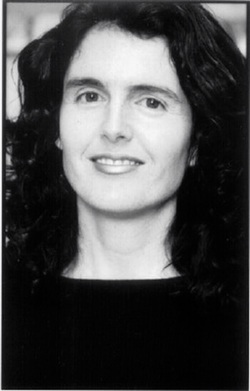 JACQUELINE LAWTON: Why did you decide to get into theatre? Was there someone or a particular show that inspired you? ANNE GARCIA-ROMERO: My Spanish father’s immediate family members were all performers. My grandparents were singers in Compañia Santa Cruz, a zarzuela troupe (Spanish light opera) that toured throughout Latin America, Central America and Cuba in the early decades of the twentieth century. The troupe included the mother of Plácido Domingo. My eldest aunt, Ana María Olaria, was a renowned zarzuela and opera singer in Spain in the 1950’s and 60’s and my uncle, Tito Mora, was a successful popular singer in Spain in the 1960’s and 1970’s. While I grew up in the Boston area, my Spanish family would visit us and we’d also spend time with them in Madrid. I was very taken by their theatrical lives. Also significantly, my American mother was a professor of Spanish literature at Pine Manor College in Brookline, MA and for the first seven years of my life, we lived on campus. From a very young age, I began accompanying my parents to the musical theater productions in the college’s impressive performing arts center. Even after we moved to nearby Wellesley, MA, I continued to see the shows at Pine Manor every year and was completely enthralled. Once, when my abuela (grandmother in Spanish) was visiting us from Madrid, we attended a musical together. Afterward, she proclaimed, “A Ani le encanta el teatro mas que nadie en nuestra familia." (Annie loves the theater more than anyone in our family.) I’ll also never forget sitting in the balcony of a Boston theater seeing Richard Kiley starring in the national tour of Man of La Mancha. I’d seen the TV ads about the show and begged my parents to take me. One of my childhood friends asked me, “Why would you want to see that?” and in my emphatic eleven year old voice, I exclaimed, “It’s my heritage!” I continue to explore and honor my heritage, my culture and my family in the plays that I write. JL: Where do you feel we are in terms of gender and race in larger landscape of the American Theatre? AGR: I feel we need to continue to address the complexities of gender and race in the American Theatre. Our 21st century society is ever more culturally diverse. The American Theatre needs to continue to embrace the multivaried ways in which race and gender present themselves in our contemporary age. Specifically, I'm currently part of a new initiative, Latino Theater Commons, a national advocacy group, that aims to connect Latino/a theater artists across the country and raise awareness of contemporary Latino/a theater in this country. In describing our aims, we focus on the need to update the U.S. narrative in American Theatre. I wrote a short article about Latino Theater Commons for Howlround.com. I share an excerpt here as I feel it also very much applies to the conversation of race and gender: “Theater can function as a reflection of our contemporary national narrative. The character journeys on a stage often help us better understand the complexities of our society. US culture in the twenty-first century continues to move from a mono-cultural to a multi-cultural experience. However, US theater currently does not always reflect this reality and therefore can perpetuate an outdated narrative. Contemporary Latino/a theater updates the US narrative through presenting diverse cultural worlds that allow theater audiences to more fully understand the US experience in the twenty-first century.” * JL: How do you feel your community has addressed the issues of race and gender parity? How has this particular issue impacted you and your ability to practice your craft? AGR: One way I feel this issue has impacted me and my craft is that, in addition to being a playwright, I'm also a theater studies scholar and have spent the last several years writing a book, Contemporary Latina Theater: Transcultural Voices, which explores the work of five award winning Latina playwrights: Cusi Cram, Quiara Alegría Hudes, Elaine Romero, Caridad Svich and Karen Zacarías and how they address culture, identity, spirituality and theatrical experimentation in their work. I felt compelled to research and write this book as these vibrant women exemplify the transcultural complexity of the twenty-first century Latina community and their work, on the whole, has not been included in Theater Studies scholarship. JL: Why is it important that we continue to have these conversations that address gender and race in theatre? AGR: I feel it is important that we continue these conversations as they raise awareness regarding these essential issues of race and gender. We need to consistently engage in a dialogue in which we share our experience, expertise and craft, and thus broaden the knowledge base about the remarkable work being generated by women of color in the American Theater. JL: What excites you about taking part in the XX Playlab Festival? AGR: I'm excited and encouraged to take part in a festival that celebrates women and diverse voices. I grew up near Boston and those formative years hugely influenced my path in the theater. Now, I'm currently based in the Chicago area so I feel honored to return to Boston to be part of this compelling conversation.
0 Comments
Your comment will be posted after it is approved.
Leave a Reply. |
My BlogI'm a playwright, dramaturg, and teaching artist. It is here where you'll find my queries and musings on life, theater and the world. My posts advocate for diversity, inclusion, and equity in the American Theatre and updates on my own work. Please enjoy!
Categories
All
Archives
June 2020
Reading List
|



